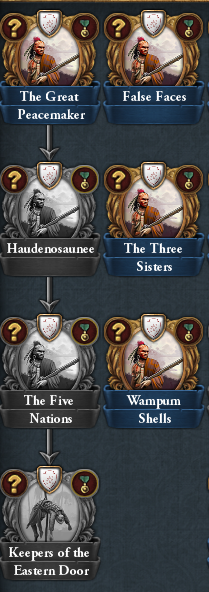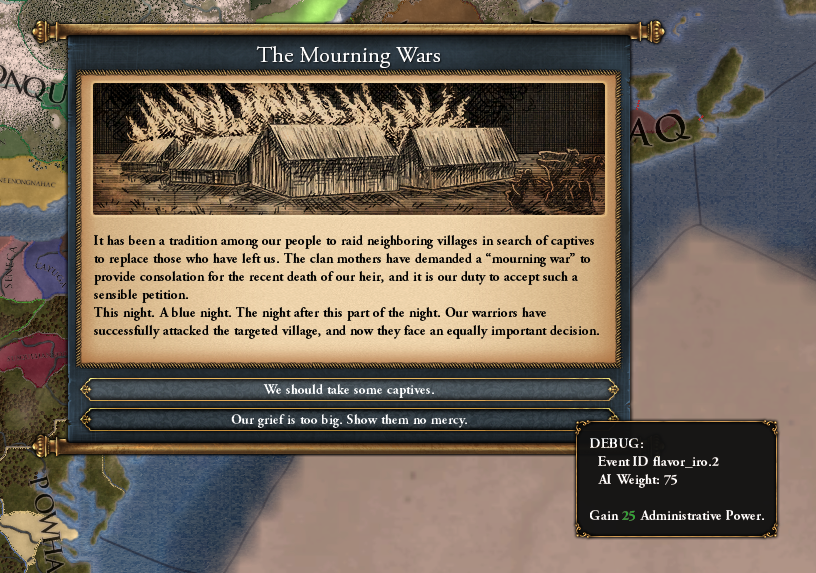Good morning! I’m skingrado, one of the new content designers for EU4 at Paradox Tinto, nice to meet you all! To begin with, I think it’s very important that you know that my favorite castle is Loarre, that’s my main personality trait, so I hope that gives you an idea of who I am (and, as you can imagine, I’m also a big fan of GSGs, and I used to play a lot of CK with my dad). But today I’m here to show you some of the things we’ve been working on for the North American Natives, since a lot of you asked for more content after the reveal of the new mechanics (nothing to do with castles, I’m afraid).
We’re creating completely new native mission trees (since until now they mainly had the generic missions) and we’ve started by designing six new geographical mission trees available to all tribes, according to their localization and culture at the time of contact (i.e. very close to the start of the game). You’ll notice that some of the traditional cultural areas have been merged into one single tree (Northwest Coast + Plateau, for example), more on this to come next week. I’ll be now talking about some that I’ve done:

(Notice that all icons are still placeholders).
The Northeastern Woodlands extend from the Atlantic Coast to the eastern Great Plains, going slightly above the Great Lakes in the north and bordering the Southeastern Woodlands in the south, roughly including the present Mid-Atlantic states. People from this region generally lived in villages with a few hundred inhabitants and used wigwams and longhouses for shelter, as well as canoes for traveling, fishing, trading and warfare. These villages were often placed near their crops, since the so-called Eastern Agricultural Complex was their main source of food, characteristic that they shared with the nearby Southeastern Woodlands.
Their social organization was based on clans, which were often named after some relevant animal to the area, such as wolf or bear (you’ll see more on clans in the events).
Some highlights of this tree include:

Then we have the North American Southwest, which mainly includes Oasisamerica and borders the Plains-Great Basin to the north. People from this region farmed as a complement to their hunter-gatherer economy (in the case of Aridoamerica tribes) or even had a truly agricultural society in the case of the Oasisamerican tribes. They also cherished precious minerals, like turquoise and cinnabar, and had some interesting ancestors that we will address now on some of the missions:
Now moving to the part that is slightly more fun, we have designed mission trees specific to some of the best known native tribes. Today, I’ll be focusing on the Iroquois:


As you can see, culture groups in Native America have been changed, and these missions will be available to those that have “iroquois” as their primary culture. These tribes are mainly known for the famous “Iroquois League” or “Iroquois Confederacy”, which was established prior to European contact and granted these nations security and protection, as well as a saying in the Great Council that ruled over them, much like how the new Federation mechanic is going to work. The focus of this tree is to form said Confederacy and extend its power:

Mourning Wars were fought when some of the tribe’s warriors were killed in battle and the spiritual balance of the village had to be restored. For Iroquois nations, grief did not come only for the loss of a loved one, but also for the loss of harmony. Thus, they would try to compensate for it, and that compensation came in the form of mourning wars. Now, a series of events will let you decide whether you should kill in revenge for the killing (which will lead to some nasty consequences, since it goes against the spirit of the war), or maybe take some captives in replacement for the dead members of the tribe.
Expect more information on this matter next week! Thank you for reading
We’re creating completely new native mission trees (since until now they mainly had the generic missions) and we’ve started by designing six new geographical mission trees available to all tribes, according to their localization and culture at the time of contact (i.e. very close to the start of the game). You’ll notice that some of the traditional cultural areas have been merged into one single tree (Northwest Coast + Plateau, for example), more on this to come next week. I’ll be now talking about some that I’ve done:

(Notice that all icons are still placeholders).
The Northeastern Woodlands extend from the Atlantic Coast to the eastern Great Plains, going slightly above the Great Lakes in the north and bordering the Southeastern Woodlands in the south, roughly including the present Mid-Atlantic states. People from this region generally lived in villages with a few hundred inhabitants and used wigwams and longhouses for shelter, as well as canoes for traveling, fishing, trading and warfare. These villages were often placed near their crops, since the so-called Eastern Agricultural Complex was their main source of food, characteristic that they shared with the nearby Southeastern Woodlands.
Their social organization was based on clans, which were often named after some relevant animal to the area, such as wolf or bear (you’ll see more on clans in the events).
Some highlights of this tree include:
- Building tall and preparing for war with the missions Wigwams and Longhouses and Raising Palisades will grant you permanent claims in the Great Lakes, apart from local defensiveness and manpower modifiers.
- Conquering the Northeast after conquering the Great Lakes will grant you a +5% to the morale of your armies.
- I have talked before about the importance of the Eastern Agricultural Complex, so having 3 irrigation canals and a total of 50 development will improve your production efficiency and grant you some extra gold.

Then we have the North American Southwest, which mainly includes Oasisamerica and borders the Plains-Great Basin to the north. People from this region farmed as a complement to their hunter-gatherer economy (in the case of Aridoamerica tribes) or even had a truly agricultural society in the case of the Oasisamerican tribes. They also cherished precious minerals, like turquoise and cinnabar, and had some interesting ancestors that we will address now on some of the missions:
- “Against the Desert” and “Taming of the Sands” compensate the player’s concern for devastation and development, since the Chihuahuan Desert is home to some of these tribes and its harsh living conditions are rewarded with claims in the region that will provide a tool for the spreading of such knowledge to neighboring provinces.
- Yucca Palm Trees were used as food and as the base material for the making of baskets or even “shampoos”, so controlling their province of production will also increase the local production efficiency and boost the economy.
- Turquoise Mining will require owning provinces with gems, salt or gold, in which mines could be created, and will also boost production and prestige, since turquoise was a valued trade good.
- Lastly, Paquimé was the ancestral home of the Mogollon people, and includes a series of archeological ruins that were burnt around the year 1340, prior to the start of the game. Owning the province and helping rebuild it will decrease the construction and development cost by -10%.
Now moving to the part that is slightly more fun, we have designed mission trees specific to some of the best known native tribes. Today, I’ll be focusing on the Iroquois:


As you can see, culture groups in Native America have been changed, and these missions will be available to those that have “iroquois” as their primary culture. These tribes are mainly known for the famous “Iroquois League” or “Iroquois Confederacy”, which was established prior to European contact and granted these nations security and protection, as well as a saying in the Great Council that ruled over them, much like how the new Federation mechanic is going to work. The focus of this tree is to form said Confederacy and extend its power:
- The Great Peacemaker will require you to have a longhouse in which an assembly can be met, and a reduced local autonomy. This will grant you a theologian named The Great Peacemaker himself, who is the legendary founder of the Confederacy and will lower your unrest.
- After gaining some allies through Haudenosaunee, and annexing the five most prominent nations of the League, your duty will be to protect the eastern coast from European explorers, specially French, since the League engaged in the decades-long Beaver Wars against them in 1609.
- False Faces will require you to have a spymaster and a spy network of at least 25 in any other country, as well as some diplomatic power. False Faces Masks were used during ceremonies to conceal one’s true nature and completing the mission will boost your spy power and spy detection by +25% each.
- Wampum Shells were the main currency used in these nations, so building a storehouse to hoard them will increase your mercantilism.

Mourning Wars were fought when some of the tribe’s warriors were killed in battle and the spiritual balance of the village had to be restored. For Iroquois nations, grief did not come only for the loss of a loved one, but also for the loss of harmony. Thus, they would try to compensate for it, and that compensation came in the form of mourning wars. Now, a series of events will let you decide whether you should kill in revenge for the killing (which will lead to some nasty consequences, since it goes against the spirit of the war), or maybe take some captives in replacement for the dead members of the tribe.
Expect more information on this matter next week! Thank you for reading
Last edited:


